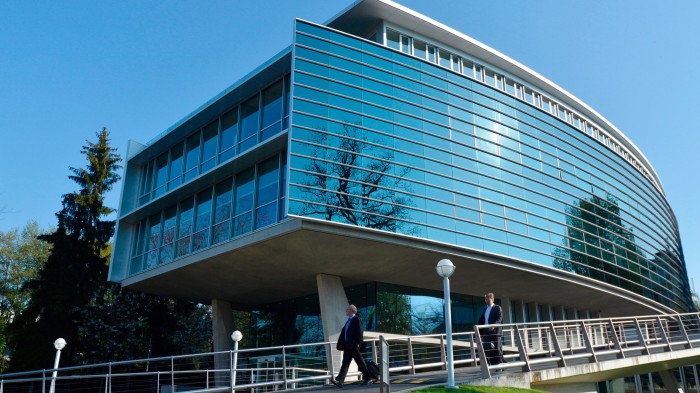Yale philosophy professor Jason Stanley said he hesitated about leaving the US for Canada until the “capitulation” this month of Columbia University to a list of demands from Donald Trump’s administration.
That settled the matter and convinced him to speak out.
“I believe in the values of academic freedom and defending democratic institutions,” he said. “Not the idea that the proper response to authoritarians is to hide and hope you’re not next.”
Stanley, along with Yale historians Timothy Snyder and Marci Shore, are joining the University of Toronto, with the latter also linking her decision with Trump winning a second presidential term.
Their actions reflect a so far small but growing pattern: American academics are emigrating in response to the policies of the new US administration, particularly its attacks on higher education. Canadian and European institutions have launched fresh efforts to lure them abroad.
Many US-based academics have seen funding cut and new job openings fall as universities freeze spending in anticipation of further financial pressure. Some are concerned about restrictions on academic freedom, with Trump’s campaign putting pressure on institutions such as Columbia, which lost its second president in 18 months last week.
Others point to the administration’s anti-science actions, including the appointment of vaccine sceptics led by Robert Kennedy Jr as Trump’s health and human services secretary. Still more feel personally unsafe against a backdrop of raids by immigration officials and tightened border controls with non-citizens being detained or deported.
Within days of Trump’s inauguration in January 20, Tim Quigley, a management professor at the University of Georgia, decided to take up a job offer in Switzerland, despite the difficulties and costs of moving abroad.
“All the guardrails came off, and it became pretty clear it was best for us to leave,” he says. “I have a 10-year-old daughter and I don’t want to live in a country which cares more about Teslas being vandalised than kids being shot in schools.”
He is joining IMD Business School in Lausanne, which early this year stepped up its recruitment from the US. It has already invited two other senior US faculty for interviews and is soon to consider five more.
More may follow. Among 293 US-based postdoctoral researchers surveyed during January and February, 78 per cent said their position was threatened or their research had been delayed.
A poll published last week by Nature of more than 1,600 US scientist readers suggested three-quarters were considering leaving the country following the disruptions driven by Trump, rising to four-fifths among the 690 who were more junior postgraduate researchers.
One Columbia scientist says: “Everything is at a standstill and there is radical uncertainty for all the people who work in laboratories: concerns about safety, whether they can travel. I was at two meetings in Europe recently and colleagues there said they were besieged by requests from people wanting to move.”
Academic institutions in other countries have stepped up recruitment, both opportunistically and in the spirit of preserving high-quality research. But the effort requires fresh funding, considerable time and overcoming other barriers — especially for scientists who often require substantial equipment and research funding beyond salaries.

Janice Stein, founding director of Toronto’s Munk School of Global Affairs & Public Policy, said she was able to hire the three Yale professors thanks to fresh support from the Temerty and Myhal families, two long-standing donors to the university.
“If we are going to meet the challenge we are going to need far-sighted philanthropists and foundations to make investments to help universities,” she says.
John Bergeron, Kathleen Dickson and Stan Kutcher, three leading Canadian academics, wrote last week in the Globe & Mail that “Canada could be a welcome home for such talent, all motivated to make the world a better place through discovery research.” But they stressed that would require greater government research funding and changes to immigration rules.
Alan Bernstein, director of global health at Oxford university, said he knew of more than 20 inquiries from US academics, but cautioned: “The UK university system is really strapped for cash. The leadership is very aware of the situation and trying to see what it can do between private philanthropy and government support.”
Lars Strannegård, president of the Stockholm School of Economics, said: “The opportunity may be not US citizens but Europeans working in the US who have always questioned how long to stay.”
Katarina Bjelke, head of the Swedish Research Council, said discussions were “quite advanced” among funders including hers to provide additional support “for American researchers and those from other countries”.
The Free University of Brussels has set up a website and contact point for “outstanding researchers under threat”. Rector Jan Danckaert said: “US universities and their scholars are the biggest victims of this political and ideological interference.”
Earlier this month, France’s Aix Marseille university launched its “Safe Place for Science” campaign, earmarking €15mn to fund at least 15 American scientists, and quickly received several dozen applications from those it said were “considering scientific exile”. It has said efforts are under way for broader national and European support.
Even the rector of the Kyiv School of Economics posted an invitation on social media last week. The unspoken implication was that Ukraine — which is feeling the brunt of Russia’s full-scale invasion — might be a safer place for academics.
“If you’re an academic feeling uncertain or threatened, [we] would be delighted to welcome you.”
Read the full article here




